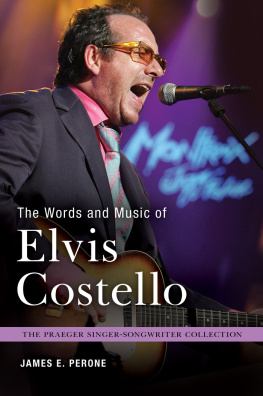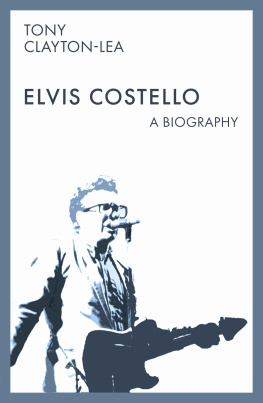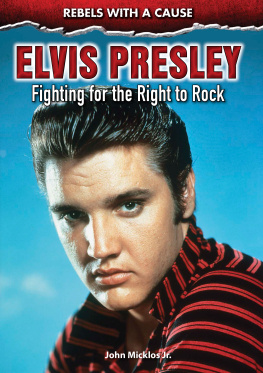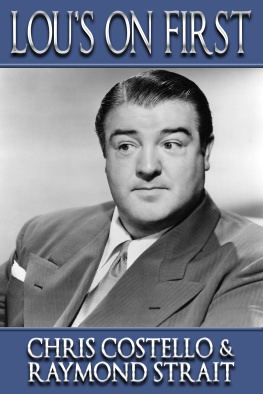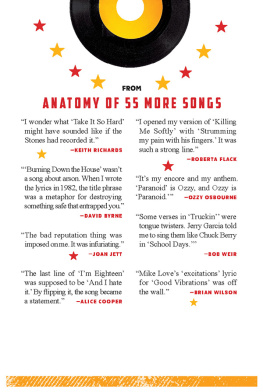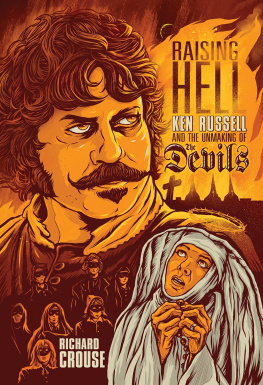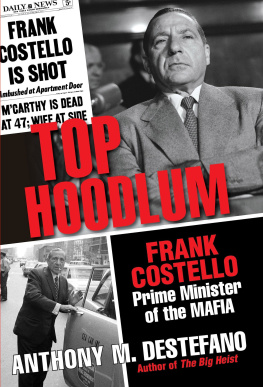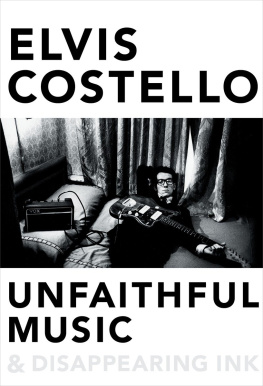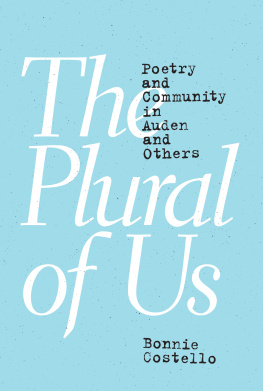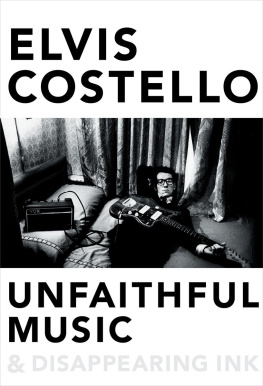Recent Titles in
The Praeger Singer-Songwriter Collection
The Words and Music of Tom Waits
Corinne Kessel
The Words and Music of Sting
Christopher Gable
The Words and Music of Van Morrison
Erik Hage
The Words and Music of Joni Mitchell
James Bennighof
The Words and Music of George Harrison
Ian Inglis
The Words and Music of Paul McCartney: The Solo Years
Vincent P. Benitez
The Words and Music of Jimi Hendrix
David Moskowitz
The Words and Music of Billy Joel
Ken Bielen
The Words and Music of Dolly Parton: Getting to Know Countrys Iron Butterfly
Nancy Cardwell
The Album: A Guide to Pop Musics Most Provocative, Influential, and Important Creations, 4 volumes
James E. Perone, Editor
The Words and Music of Melissa Etheridge
James E. Perone
The Words and Music of Alanis Morissette
Karen Fournier
THE PRAEGER SINGER-SONGWRITER COLLECTION
The Words and Music of Elvis Costello
James E. Perone

Copyright 2015 by James E. Perone
All rights reserved. No part of this publication may be reproduced, stored in a retrieval system, or transmitted, in any form or by any means, electronic, mechanical, photocopying, recording, or otherwise, except for the inclusion of brief quotations in a review, without prior permission in writing from the publisher.
Library of Congress Cataloging-in-Publication Data
Perone, James E.
The words and music of Elvis Costello / James E. Perone.
pages cm. (The Praeger singer-songwriter collection)
Includes bibliographical references and index.
ISBN 9781440832154 (hard copy : alk. paper) ISBN 9781440832161 (ebook) 1. Costello, ElvisCriticism and interpretation. 2. Rock musicGreat BritainHistory and criticism. I. Title.
ML420.C685P472015
782.42166092dc232015000977
ISBN: 9781440832154
EISBN: 9781440832161
19 18 17 16 151 2 3 4 5
This book is also available on the World Wide Web as an eBook.
Visit www.abc-clio.com for details.
Praeger
An Imprint of ABC-CLIO, LLC
ABC-CLIO, LLC
130 Cremona Drive, P.O. Box 1911
Santa Barbara, California 93116-1911
This book is printed on acid-free paper 
Manufactured in the United States of America
Contents
Series Foreword
Although the term singer-songwriter might most frequently be associated with a cadre of musicians of the early 1970s such as Paul Simon, James Taylor, Carly Simon, Joni Mitchell, Cat Stevens, and Carole King, the Praeger Singer-Songwriter Collection defines singer-songwriters more broadly, both in terms of style and time period. The series includes volumes on musicians who have been active from approximately the early 1960s through the present. Musicians who write and record in folk, rock, soul, hip-hop, country, and various hybrids of these styles are represented.
What do the individuals included in this series have in common? Some have never collaborated as writers, whereas others have, but all have written and recorded commercially successful and/or historically important music and lyrics at some point in their careers.
The authors who contribute to the series also exhibit diversity. Some are scholars who are trained primarily as musicians, whereas others have such areas of specializations as American studies, history, sociology, popular culture studies, literature, and rhetoric. The authors share a high level of scholarship, accessibility in their writing, and a true insight into the work of the artists they study. The authors are also focused on the output of their subjects and how it relates to their subjects biographies and the society around them; however, biography in and of itself is not a major focus of the books in this series.
Given the diversity of the musicians who are the subject of the books in this series, and given the diversity of viewpoint of the authors, volumes in the series differ from book to book. All, however, are organized chronologically around the compositions and recordings of their subjects. All of the books in the series also serve as listeners guides to the music of their subjects, making them companions to the artists recorded output.
James E. Perone
Series Editor
Acknowledgments
As has been the case for all of the writing that I have done for Praeger Publishers, I am indebted to the Praeger acquisitions and editorial staff, as well as to the copyeditors with whom they contract. I am grateful that this well-oiled machine raises questions that I had not considered, provides such a keen eye to help find every uncrossed t and undotted i, and manages to make the entire process as smooth as possible.
I would like to extend a very special thank you to my friend Mark Calvert. After Mark and I graduated from high school and went off to different universities, he obtained a job working at the Duke University radio station. There, Mark learned about all kinds of novel acts that were generating a considerable amount of excitement in Great Britain, although they had not broken yet in a significant way in the United States. It was because of tips from Mark that I first became enamored with the music of Elvis Costello and became acquainted with the Damned, the Sex Pistols, the Jam, Nick Lowe, and the Stranglers. Because of Mark, this perhaps is the one book in the Praeger Singer-Songwriter Collection that I have always dreamed about writing.
I would especially like to thank my wife, Karen, for encouraging me throughout the writing, editing, and indexing process over the course of this (and every previous) project.
Despite all of the help of these individuals and organizations, there are bound to be some errors, some controversial interpretations of the words and music of Elvis Costello; they are all mine.
Introduction
Elvis Costello is the stage name of the London-born singer, songwriter, and guitarist Declan Patrick MacManus. Costello was born on August 25, 1954, to Lillian MacManus (ne Alda Ablett), who ran a record store in Selfridges department store, and Ronald (Ross) MacManus, a trumpeter and singer with the Joe Loss Orchestra. Costellos Irish Catholic heritage came from both sides of his family and later would manifest itself in his compositions.
Ross MacManuss work with the Joe Loss Orchestra included performances of cover versions of then-current popular hits, including on BBCs Light Programme. Because of the emphasis on singing cover versions of popular hits, Ross MacManus had access to newly released recordings of the hits of the day, as well as demo records. Interestingly, at one point of his career, Ross MacManus briefly adopted his grandmothers family name, Costello, as his stage name. As a result of his fathers work, young Declan MacManushereafter referred to as Elvis Costelloheard a greater amount and a wider range of music than would have been typical of a British youth growing up in the 1950s and 1960s. Incidentally, a number of the songs that Costello first learned from his fathers collection of records made their way onto Costellos Kojak Variety album. Elvis Costello became a lifelong record collector, and his later work as a songwriter and his covers of older Tin Pan Alley songs, jazz classics, and American country songs undoubtedly were shaped by the eclecticism of the music that surrounded around him as a child and youth.
Elvis Costello has been widely hailed as one of the best rock songwriters in the history of the genre. For example,
Next page
